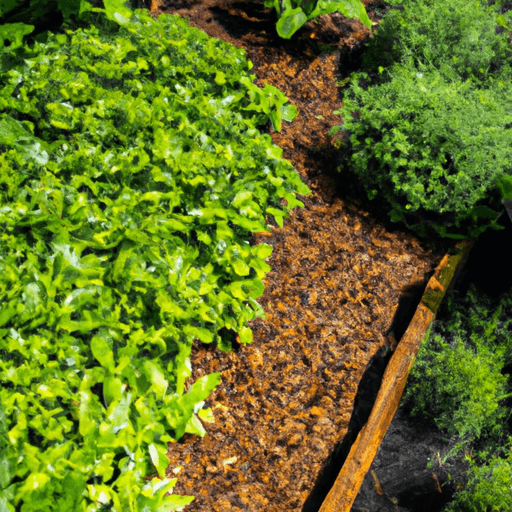Coffee grounds are a valuable addition to any garden, offering numerous benefits through composting. Contrary to popular belief, coffee grounds do not alter soil acidity. Instead, they promote the growth of beneficial soil microbes, which aids in the breakdown of organic matter.
While coffee grounds alone do not act as a nitrogen fertilizer, they can be combined with nitrogen-rich materials or composted before use. Additionally, coffee grounds can be used as mulch, natural fertilizer, or to discourage pests. They can even be incorporated into vermicomposting systems to feed worms.
The Benefits of Coffee Ground Composting
Using coffee ground composting in the garden can provide numerous benefits for the environment and soil fertility. It enhances soil health by enriching it with organic matter, which improves nutrient availability and water retention.
Coffee grounds also act as a natural fertilizer, supplying essential nutrients like nitrogen, phosphorus, and potassium to plants. Additionally, coffee ground composting improves drainage in the soil, preventing waterlogging and reducing the risk of root rot.
The presence of coffee grounds in the compost also promotes the growth of beneficial microbes, which aid in breaking down organic matter and releasing nutrients. This process creates a healthy and thriving soil ecosystem, supporting the growth of plants and contributing to overall garden productivity.
Understanding the Acidity of Coffee Grounds
Coffee grounds have a pH between 6.5 and 6.8, making them close to pH neutral after brewing. This means that coffee grounds do not significantly impact the pH of the soil when added directly. However, when it comes to soil microbes, coffee grounds play a crucial role.
- Coffee grounds encourage the growth of soil microbes, which are essential for the breakdown of organic matter in the soil.
- These microbes consume nitrogen during the breakdown process, resulting in a temporary nitrogen shortage in the soil.
- To compensate for this, nitrogen fertilizer can be added along with the coffee grounds.
- Alternatively, composting the coffee grounds before adding them to the soil can help mitigate the nitrogen shortage.
- By adding coffee grounds to the soil, you are providing a food source for beneficial microbes, promoting a healthy and thriving soil ecosystem.
Using Coffee Grounds Directly in Your Soil
Adding coffee grounds directly to the soil does not act as a nitrogen fertilizer, but it does contribute to the growth of soil microbes.
While coffee grounds may not provide an immediate source of nitrogen for plants, they offer several benefits when used in soil. Coffee grounds are rich in organic matter, which helps improve soil structure and drainage. They also contain essential nutrients like potassium, phosphorus, and magnesium.
Compared to traditional fertilizers, coffee grounds are a more sustainable and eco-friendly option. They are a waste product that can be repurposed in the garden, reducing the need for chemical fertilizers. Additionally, coffee grounds can attract earthworms, which further enhance soil health.
Maximizing the Breakdown Process in a Compost Pile or Bin
Regularly turning the compost pile or bin can accelerate the breakdown process and promote the decomposition of organic materials. This maximizes the decomposition rate and ensures that the compost is ready for use in the garden as quickly as possible.
Coffee grounds can be a valuable addition to the compost pile, serving as a soil amendment that adds important nutrients to the mix. Here are two ways in which coffee grounds can be used to enhance the breakdown process and improve the quality of the compost:
-
Coffee grounds can be added to the compost pile in layers, alternating with other organic materials such as leaves or kitchen scraps. This helps create a balanced mix of green and brown materials, which aids in the decomposition process.
-
Coffee grounds can also be sprinkled directly on top of the compost pile. This provides an additional source of nitrogen, which is essential for the breakdown of organic matter. The nitrogen-rich coffee grounds act as a catalyst, speeding up the decomposition process and ensuring that the compost becomes nutrient-rich.
Exploring the Benefits of Coffee Grounds in Bokashi Composting
Maximizing the breakdown process in a Bokashi composter involves incorporating coffee grounds, along with other organic materials, and using Bokashi compost accelerator to enhance the fermentation process.
Bokashi composting is an alternative composting method that utilizes a closed container and anaerobic conditions.
Coffee grounds can be added to a Bokashi composter without the need for a specific ratio of green and brown composting materials.
By adding Bokashi compost accelerator, which contains effective microorganisms, the breakdown process is further enhanced.
This method of composting allows for the breakdown of organic matter, including coffee grounds, in a shorter period of time compared to traditional composting methods.
Utilizing coffee grounds in Bokashi composting is a sustainable gardening practice that not only reduces waste but also provides a nutrient-rich soil amendment for your plants.
Creative Ways to Use Coffee Grounds in Your Garden
Coffee grounds can be repurposed in the garden by using them as a natural barrier to deter pests like slugs and snails. Here are some creative ways to use coffee grounds in your garden:
-
Coffee grounds crafts:
-
Mix coffee grounds with flour, salt, and water to create a natural clay-like dough for crafting projects.
-
Use coffee grounds as a natural dye to color fabrics or paper for arts and crafts.
-
Coffee grounds for pest control:
-
Sprinkle coffee grounds around the base of plants to create a barrier that pests like slugs and snails will avoid.
-
Mix coffee grounds with water to create a spray that can be used to deter ants and other crawling insects.
Incorporating coffee grounds into your garden not only helps with pest control but also adds organic matter to the soil, improves drainage, and provides nutrients for plants. So, next time you brew a cup of coffee, don’t throw away those grounds – put them to good use in your garden!
Coffee Grounds as Mulch: A Natural Enhancement for Your Garden
Adding a layer of coffee grounds as mulch helps to retain moisture in the soil and suppress weed growth. Coffee grounds act as a natural weed control by creating a barrier that inhibits weed seeds from germinating.
Additionally, coffee grounds serve as a soil conditioner, enriching the soil with organic matter and nutrients. As the coffee grounds break down, they release nitrogen, potassium, phosphorus, and other essential elements that are beneficial for plant growth. The dark color of the grounds also absorbs sunlight, keeping the soil warm and promoting healthy root development.
Moreover, coffee grounds improve soil structure by enhancing its water-holding capacity and promoting aeration. This encourages the growth of beneficial soil organisms, such as earthworms, which further enhance the soil’s fertility.
Overall, incorporating coffee grounds as mulch is a sustainable and effective way to enhance your garden while reducing waste.
Coffee Grounds as a Natural Fertilizer: Nourishing Your Plants
Using coffee grounds as a natural fertilizer provides plants with essential nutrients and promotes healthy growth. Coffee grounds are a great option for organic fertilizers, offering several benefits compared to other natural fertilizers.
-
Nutrient-rich: Coffee grounds contain essential nutrients like nitrogen, potassium, and phosphorus, which are vital for plant growth and development. These nutrients are slowly released into the soil, providing a steady supply for plants.
-
Soil improvement: Coffee grounds improve soil structure and drainage, making it easier for plant roots to access nutrients and water. They also enhance soil fertility by promoting the growth of beneficial microbes.
-
Sustainable and cost-effective: Coffee grounds are readily available and can be obtained for free from local coffee shops. By using coffee grounds as a natural fertilizer, gardeners can reduce their reliance on synthetic fertilizers, contributing to a more sustainable gardening practice.
Compared to other natural fertilizers, coffee grounds offer a balanced pH level, making them suitable for a wide range of plants. They also help to repel pests, such as slugs and snails, creating a natural barrier around plants. Incorporating coffee grounds into your gardening routine can provide numerous benefits for your plants and the environment.
Using Coffee Grounds in Vermicomposting: Boosting Your Worms’ Diet
Vermicomposting enthusiasts can nourish their worms by incorporating nutrient-rich coffee grounds into their worms’ diet. Coffee grounds are an excellent addition to vermicomposting systems as they provide a source of organic matter and essential nutrients for the worms.
When added to the worm bin, coffee grounds help boost worm health by increasing the overall nutrient content of the worm castings. The worms consume the coffee grounds, breaking them down and transforming them into nutrient-rich vermicompost.
To incorporate coffee grounds into the vermicomposting process, it is important to mix them with other organic materials, such as shredded newspaper or vegetable scraps, to create a balanced diet for the worms.
Frequently Asked Questions
Can Coffee Grounds Be Used as a Natural Pesticide in the Garden?
Coffee grounds can be used as a natural pesticide in the garden by creating a barrier around plants to deter pests like slugs and snails. In addition, coffee grounds provide benefits as a fertilizer and can enhance gardening practices.
How Long Does It Take for Coffee Grounds to Break Down in a Compost Pile?
Coffee grounds typically take about 3-6 months to fully break down in a compost pile. While they can enhance the decomposition process, their effects on composting depend on factors such as the composting method and the presence of other organic materials.
Are There Any Specific Plants That Benefit More From the Addition of Coffee Grounds?
Coffee grounds can benefit a wide range of plants in the garden. Their organic matter enriches the soil, improves drainage, and enhances the growth of beneficial microbes. Incorporating coffee grounds into gardening techniques can promote healthier and more productive plants.
Can Coffee Grounds Be Used in Hydroponic Gardening Systems?
Coffee grounds can be used in hydroponic gardening systems, but their impact on plant growth and water quality may vary. It is important to carefully monitor nutrient levels and pH balance when incorporating coffee grounds into hydroponic setups.
Are There Any Potential Risks or Drawbacks to Using Coffee Grounds in the Garden?
Potential hazards or negative effects of using coffee grounds in the garden include overuse, which can disrupt the nutrient balance, and attracting pests. However, when used in moderation and properly composted, coffee grounds can enhance soil health and plant growth.







